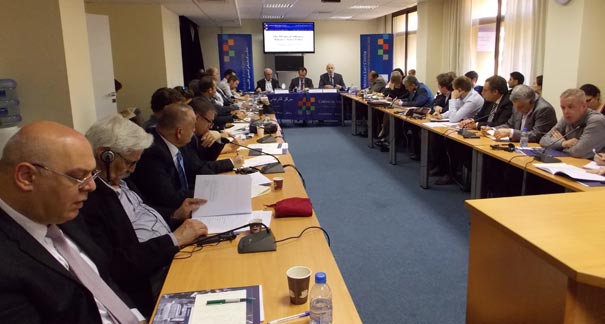Registration
You will receive an email confirming your registration.
The Syrian conflict, now two years old, has claimed over 70,000 lives, brought destruction to the country and destabilized the Middle East. Deadlock at the United Nations Security Council has so far dashed international hopes for finding an end to the crisis. In a new Carnegie paper, The Mythical Alliance: Russia’s Syria Policy, Dmitri Trenin argues that Russia’s policy leaves ample opportunity for international cooperation to achieve a political settlement to the Syrian crisis.
In order to discuss the report’s findings, the Carnegie Middle East Center hosted Trenin, director of Carnegie’s Moscow Center, Jihad El-Zein, a columnist and senior editor with Annahar newspaper in Beirut, and Yezid Sayigh, a senior associate at the Carnegie Middle East Center. Carnegie’s Paul Salem moderated.
The Argument
Trenin argued that Russia’s policy on Syria is misunderstood. He argued that there is a fuller story on Russia’s Syria policy than what is offered by the mainstream media.
- Foundations for Russian Policy: Trenin highlighted four layers, in order of importance, for Russia’s policy toward Syria:
- Concern of World Order: Trenin argued that Russia is principally interested in the question of national sovereignty. Russia’s position on Syria is informed by its experience in Libya, where policymakers felt deceived by the eventual intervention after Russia approved the NATO-led campaign.
- Unease With Arab Spring: Unlike the United States and Western Europe, Russia was initially less optimistic about regional developments. Trenin added that most Russian analysts now agree that Islamist forces are the largest beneficiaries of the Arab Spring, an unwelcome outcome that has shaped their view of the Syrian crisis.
- Military Aspects: Syria is not a major arms market or strategic military ally, despite common views otherwise. Russia has already forgiven Damascus billions worth of arms sales, and the significance of Russia’s naval base in Syria is overstated, Trenin argued.
- Growing Orthodox Spiritualism: The Orthodox Church and the Kremlin have entered into a real alliance, Trenin said. The Kremlin has taken up the role as a spiritual leader of Christianity, and this policy has reinforced Russian unease with the Islamist elements of Syrian rebels and its impact on the region’s Christian minorities.
- International Responsibility: Trenin emphasized that international actors have failed on Syria, and that all countries, including Russia and the United States, bear some responsibility. Although Syria is rapidly devolving toward becoming a failed state, Trenin maintained the need for a Dayton-type settlement that encourages all parties to reach a political solution.
A Contrasting View
- Objective Analysis: El-Zein praised the paper’s comprehensive approach to Russian policy and its objective assessment of all political views, including ones that Trenin disagreed with.
- A Strategic Relationship: El-Zein also challenged Trenin’s characterization of Russian-Syrian relations as a “mythical alliance.” Citing Russia’s military and operational support of the Syrian government, El-Zein argued that Russia and Syria have entered a strategic relationship, quite the opposite of the paper’s argument.
A Path Forward
- Minimal Strategic Interests: Sayigh agreed with Trenin’s argument that Syria is not essential to Russia’s strategic interests as well as his claim that neither the United States nor Russia has a major international dispute over Syria. Sayigh highlighted several key points:
- Syria Is Not Vietnam: Sayigh argued that the Syrian conflict will not end like the U.S. involvement in Vietnam. There will be no images of a sole remaining Russian adviser leaving Syria, as was the case with the United States in 1975.
- Likely Regime Survival: While the Baath regime’s power will continue to erode, regime collapse is unlikely, Sayigh said. Instead, a more likely outcome will be a “third force” composed of Baathists and opposition figures. Both the United States and Russia will welcome this outcome, Sayigh added.
- Russia Must Be Reengaged: Sayigh agreed with Trenin that Russia must be engaged differently. However, because the current Syrian government will not likely remain in the same form, Russia must also accept an imperfect outcome for their interests.
- Finding a Peaceful Solution: Sayigh questioned whether a Dayton or Taif-style agreement is ideal, given that both settlements were based on communal or sectarian identities. He expressed concern that Syria’s outcome will be decided by violence instead of moderation and engagement, given that neither the United States nor Russia has major interests in Syria.
Trenin’s Response
- A Client Relationship: Trenin explained that Russia’s Syrian policy is more akin to a client-based relationship than a real alliance, hence his use of the term “mythical.” While Trenin confirmed that Russia is providing strategic support to the Syrian government, he views this as a calculated assessment that the current government is a better alternative to regime collapse or Islamist rule, rather than evidence of an alliance.
- Core Interests: For Russia, Trenin added, support of the Syrian government is more about protecting their core interests than geopolitical dominance in the Middle East, as was the case during the Cold War.
Trenin closed his remarks by stressing that the United States and Russia have been too disassociated from the Syrian crisis, and that both parties are partially to blame for continuing violence. He reiterated his view that Russia does not want to preserve the regime, but rather prevent a worse alternative from emerging in Syria, even though both U.S. and Russian foreign policies have been unsuccessful in averting that outcome so far.
